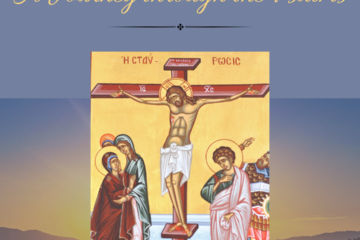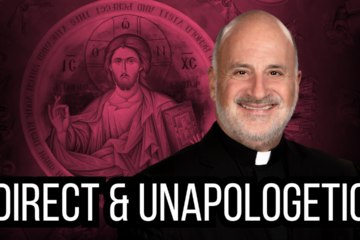Going Which Way?
Great Lent begins and with it begins a time of reorientation of ourselves. The Church tells us, take a portion of our year, and rededicate it to God. One of the Fathers of the Church, St. Dorotheos of Gaza, calls it a tithe of time The forty days of Great Lent is ten percent of our year. This tithe is to be used to intensify our spiritual efforts, especially prayer, fasting and almsgiving. Over the past few weeks, we have been given guidance to make Great Lent more meaningful and spiritually rewarding. The last Sunday before Lent teaches that to know where you are going, you must know where you have been. On that Sunday we commemorate the expulsion of Adam and Eve from Paradise. It is this event that defines us. Adam and Eve were created to live forever. However, once they disobeyed God, once sin was introduced to their being they could no longer remain in Paradise. If they lived forever, sin would also exist forever. This tragic and painful existence could not continue. Now dominated by sin, Adam and Eve would be unable to live in the presence of God. Sin forces us from God, and humanity could not bear to live with Him in this wretched state. As they are expelled, they are now mortal and are afflicted with the results of the fall from grace. Humanity now endures corruption (growing old and dealing with sickness) and susceptible to sin and death. We are not responsible for the sin of Adam and Eve; but we do receive as our nature the results of their sin. This defines who we are. Three questions come to mind reflecting on who we are: Where were we? Where are we? Are we going in the right direction?
Where were we?
To know where we are and where we are going, we must know where were once were (we should know our origins). Adam and Eve (and all humanity) are the crown of God’s creation. As you read in Genesis you will see that God simply says the word and something is created (i.e., “Let there be light….”). But with the creation of man Genesis tells us that God took special care in making us, with His own two hands He forms us out of the dust and breathed the breath of life into us. (Genesis 2:4-7). Humanity was created to live forever with God in Paradise. He created us in His image and in His likeness (Genesis 1:26). God gave humanity certain attributes that are godly and godlike (i.e. the ability to reason, to love , to know, to name but a few). We were created special by God and created to live forever. Humanity was and is a truly blessed creation. In Paradise man had direct communion with God, an intimate relationship that was as important and basic to man as air or food or water.
This relationship was destroyed when Adam and Eve, using their God given free will, disobeyed God (Genesis chapter 3). The response of God to this disobedience was Adam and Eve’s exile from Paradise. The intimate relationship between man and God was severed. This disobedience brings another more tragic and painful consequence, death. Man, who had been created to live forever, would now suffer a horrible thing, the body would cease to function (die) and the soul would be separated from it. The soul would continue to exist but separated from God.
We were in Paradise with God created to live with Him forever. But deceived and misusing the freewill God had bestowed upon them, our forebearers are exiled from Paradise and separated from God. They are kept from Paradise by the cherubim and flaming sword. (Genesis 3:24). As much to protect the fallen Adam and Eve from the glory of God as to keep them from the Tree of Life. As a reminder of this, during the service of Vespers there is a monastic tradition to place a lit candle in front of the closed Royal Doors as Psalm 140 (141) is chanted and the priest or deacon begins to cense the Altar, Church and Faithful The psalm says: “Lord I have cried out to you, hear me. Hear me O Lord”. The lit candle symbolizes Adam and Eve standing outside of the entrance to the Garden of Eden, lamenting the loss of Paradise. We too implore God, “hear me of Lord, give heed to the voice of my supplication!”. We should desire to be with God! Great Lent is the perfect time to act on that desire to know and be with God.
Where are we?
The entire Old Testament describes the efforts of man and the action of God to help restore the relationship between God and man. The Law of Moses, the rules and regulations recorded in the Pentateuch (first five books of the Old Testament), the Judges and Kings, and the message of the Prophets could not in themselves relieve mankind’s suffering. But He who they proclaimed, the Messiah could! The anointed One of God, the Christ, would bring salvation to all the people of the world. With the birth of Christ, we now have the means to return to God. His mission fulfills the Law and the Prophets and in Him we become capable of following those very commandments.
The work of our Lord, His preaching and teaching; His miracles; bring us to His Passion. It is here, on the Cross, with His death and resurrection that Christ re-opens the road back to God and Paradise. The gates of Paradise are reopened, and a bridge has been built; we no longer need to be separated from God. Following His commandments and the teachings of His Church we have the potential to be with God. This is where we are now. We have been baptized and confirmed into the faith and the road to God is laid out before us. We are called to walk the walk in Christ. This road is a pilgrimage for our salvation. Our journey of salvation began some 2,000 years ago with our Lords birth and His Passion on Golgotha. With His Passion and Resurrection sin and evil are overthrown, they have no power over us, and we are given the grace to become the children of God. At our baptism we are given the grace to know and experience our Lord’s offer of salvation. However, it is not enough to be baptized; we must act , we must respond. As we mature in the faith there is a daily effort to grow in Christ, to respond to His salvation to utilize the grace given us at our baptism. This is the process of salvation. We are saved with Christ on the cross, we are in the process of being saved as we walk with Christ, and we look forward to our sour salvation when Christ returns. We need to practice and live our faith, participate in the mysteries of Holy Communion and Confession, have an active prayer life, read the Scriptures, be loving and merciful and forgiving and become a righteous person. Our hope is as we depart this life our loving God receives us into His Kingdom.
Where are we going?
How many times have been asked, where are you going? If you know, for instance the store, or down the street, or to visit a relative, the answer is simple. If asked how to get there, you can give directions. But what if you do not know where you are going? This is the case with many people in our world today. They do not know where to go or where to turn and thus become confused and lost. There is an Apache saying, “If we do not turn around now, we may get to where we are going!” All of us need to take the time and ask ourselves where are we going? Now is the time to walk with God.
Fr. Thomas J Zaferes


0 Comments